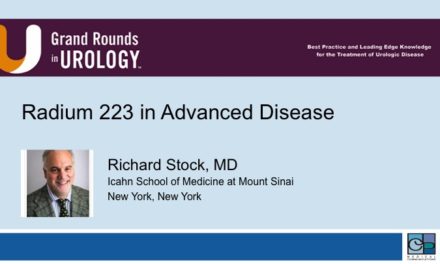Franklin Gaylis, MD, presented “Pay for Performance Model to Improve Quality of Active Surveillance in Low-Risk Prostate Cancer” for the Grand Rounds in Urology audience in June 2021.
How to cite: Gaylis, Franklin. “Pay for Performance Model to Improve Quality of Active Surveillance in Low-Risk Prostate Cancer” June 2021. Accessed Dec 2024. https://dev.grandroundsinurology.com/pay-for-performance-model-to-improve-quality-of-active-surveillance-in-low-risk-prostate-cancer/
Pay for Performance Model to Improve Quality of Active Surveillance in Low-Risk Prostate Cancer – Summary:
In the final installment of a 3-part series, Franklin Gaylis, MD, FACS, Chief Scientific Officer of Genesis Healthcare Partners and Voluntary Professor of Urology at the University of California, San Diego, reviews measures derived from a project looking at the value of a pay for performance model in improving the quality of active surveillance in low-risk prostate cancer. He explains that this project, which was a collaboration between UnitedHealthcare and Genesis Healthcare Partners, resulted in four measures for determining the success of this pay for performance model. The first bar to be cleared is that doctors have to test at least 90% of patients using the electronic medical record (EMR)-embedded template. The other three measures call for physicians to adopt active surveillance or watchful waiting for at least 75% of patients with low-risk prostate cancer, to conduct PSA tests biannually on at least 75% of those patients on active surveillance, and to also perform confirmatory biopsy on at least 75% of the patients on active surveillance within 18 months. Dr. Gaylis then looks at the utility of the EMR-embedded template itself, noting that it is easy to use and can accurately capture a patient’s risk category and tumor stage. He also observes that its metrics are essentially available on demand, and using it can result in a 26-fold decrease in cost compared to quarterly data abstraction. Dr. Gaylis concludes by reiterating that the US healthcare system is transitioning from volume to value, and notes that collaborative efforts between physicians and the government, like the UnitedHealthcare/Genesis project, may result in the best standards and practices for the country.
Part of this series 1 can be viewed here, while part two can be seen here.
Disclosure: Dr. Gaylis has an ownership stake in GenIT LLC, which owns WizMD, a software program created at Genesis Healthcare Partners that is used for data extraction. It currently has no significant value.
ABOUT THE AUTHOR
Franklin Gaylis, MD, FACS, is Chief Scientific Officer of Genesis Healthcare Partners (GHP), an Integrated Urology Group, and voluntary Professor of Urology at the University of California, San Diego. He received his MBBCh/MD (Cum Laude) from the University of Witwatersrand in Johannesburg, South Africa, where he graduated in the top 5% of his medical school class. After a year of basic science research, Dr. Gaylis completed his general surgical training at the University of Minnesota and his specialty training in urology at Northwestern University Medical School in Chicago, Illinois. He was nominated to the distinguished Alpha Omega Alpha Medical Honor Society at Northwestern.
Dr. Gaylis is a Fellow of the American College of Surgeons and a member of the California Medical Association and American Urological Association. He is a diplomat of the American Board of Urology. He lectures nationally and internationally on the subject of medical quality. His research has been published in clinical journals such as Urology, Journal of Urology, and New England Journal of Medicine. Dr. Gaylis’ practice is focused on early and late stage prostate cancer. He actively pursues cutting-edge research on quality improvement and methods to optimize clinical outcomes. He has developed clinical tools aimed at improving outcomes following radical prostatectomy as well as reducing cost. Dr Gaylis and his team at Genesis Healthcare Partners have been awarded a Pay-for-Performance demonstration project by UnitedHealthcare to optimize the quality of active surveillance for low-risk prostate cancer. He has also developed a urinary tract dilator instrument to facilitate the efficient removal of kidney stones that has improved the safety of the procedure and has significantly reduced costs.





